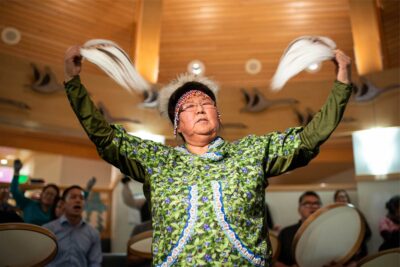ProPublica is a nonprofit newsroom that investigates abuses of power. Sign up to receive our biggest stories as soon as they’re published.
This article was produced in partnership with the Anchorage Daily News, a member of the ProPublica Local Reporting Network.
Alaska has the highest rate of sexual assault in the nation, nearly four times the national average. Read our collection of stories from survivors choosing to speak.
A few years ago, Marie Sakar moved to the village of Chuathbaluk in Western Alaska to teach at the tiny village school.
It meant returning to the place she’d been running away from for her entire adult life.
Sakar grew up in the fish camp-turned-village on the banks of the Kuskokwim River, enduring years of sexual abuse.
She’d left as soon as she could, becoming a mother and earning a college degree in elementary education. But nothing chased away the memories of being molested, or the self-destruction that had followed.
And yet, Sakar, now 48, knew she had to return home to the community of 100 people.
“It’s so ironic — I’m finally at home,” she said. “But this is the toughest assignment I’ve ever had.”
Chuathbaluk was in some ways a sweet place to grow up: Sakar had loving parents and grandparents who taught her Yup’ik traditions. But starting around age 3 or 4, she was molested by older boys in the village.
The first boy to abuse Sakar issued a frightening warning: If she told, her parents would hate her and blame her. She believed him.
“I used to be brought into abandoned houses, smokehouses, steam baths, in the trees or in the grasses,” Sakar said. “Raped and molested.”
As soon as she could, Sakar left the village. She was raped again and became pregnant. Sakar placed her first daughter for adoption because she feared mistreating her.
She went to college and became a teacher. She had another daughter, and began raising her as a single mother.
Drinking became a quick and effective way to blot out her pain — not so different from the games she’d invented as a child where she’d close her eyes and try to travel to another world when she was being molested. Alcohol made her life an unmanageable mess. She knew she had to quit.
“I was covering up hurt upon hurt,” she said.
At the cemetery in Kwethluk, she cried at the grave of Matushka Olga Michael, a Yup’ik woman venerated by some Orthodox Christians in Western Alaska as a healer of women, especially those who have been sexually abused.
“The only way to go was up,” she said. “I prayed like I never prayed before.”
She took her last drink on July 5, 2007. Sakar married and had three more daughters.
“They have only seen me sober,” she said.
Sakar heard someone say that silence about sexual abuse only served to protect the abusers. She began confronting the men who hurt her.
Those who felt guilty looked away, acted “like their bodies were on fire,” she said.
She and a cousin who abused her as a child went to see her father at a nursing home in Anchorage. By now he was deep into Alzheimer’s disease.
Though she wasn’t sure her dad could understand, she told him what the cousin had done to her.
The three held hands in a circle and prayed.
On the drive home, the cousin asked if she was sure she could forgive him.
“I have to,” she said. “I can’t hold on to this hate and this anger. I have to let it go. It’s bringing me down.”
She began telling her story to a broader audience. In 2009, she stood up in the middle of a child welfare conference in Anchorage and described the devastating impact of her childhood of sexual abuse. The chattering audience fell silent. People stood and clapped, and lined up to hug her afterward.
“People said, ‘You know what, that was my story too,’” she said. “And it wasn’t just women.”
Her words and picture landed on the front page of the Tundra Drums newspaper.
The biggest betrayal, and her biggest test of her sobriety, came in 2013, when Sakar learned that her husband — the father of three of her girls — had raped a family member.
Sakar helped police investigate her husband’s crimes. She learned he had lied to her about having been convicted of a similar crime years earlier.
In 2015, Sakar’s ex-husband, Peter Nick Jr., pleaded guilty to one count of sexual abuse of a minor. His attempt to appeal his conviction failed. He is scheduled to be released from prison in 2048.
In a letter from prison at Alaska’s Spring Creek Correctional Center, Nick said he is still appealing his sentence on the grounds that he received ineffective assistance from his court-appointed attorney.
Sakar says she wants, but doesn’t expect, justice through the courts for the men who raped her.
Living in Chuathbaluk is sometimes painful.
Sharing Yup’ik dances and language with her students is a joy. But she grapples with the daily complexity of running into her abusers at the post office or the sole grocery shop.
Only about 100 people live in Chuathbaluk, and Sakar interacts with nearly all of them.
During Slaviq, the Russian Orthodox Christmas holiday celebrated in Western Alaska villages, groups of people walk from house to house, entering to sing carols.
Earlier this year, Sakar stood fuming as a man who had assaulted her stood in her house.
It’s hard, but Sakar says she will stay. In villages like Chuathbaluk, teachers often quickly cycle through, disappearing after a year or two. Sakar didn’t have an Alaska Native teacher until high school.
Having an adult presence outside the home to confide in would have changed her girlhood. As a teacher, she wants to be that person for the children of the village today.
“I tell them, I’m here,” she said. “I’m not going anywhere. This is where I’m from.”



